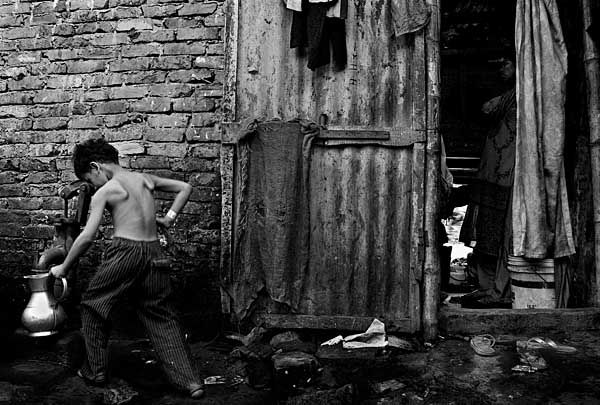The Eye of the Beholder??
Dhanushkha Amarasekara
Sri Lanka
?A tree that can fill the span
Of a man?s arms Grows from a downy tip;
A terrace nine stories high
Rises from handfuls of earth;
A journey of a thousand miles
Starts from beneath one?s feet.?
– Lao Tzu

This body of work is a series of images produced in Patna, India, in 2006. The subject matter is inspired by my own spiritual journey and interest towards the Buddhist way of life, in which mental freedom is something very important in its philosophy, and how it can have quite a dramatic effect on one?s life. As an Islander, a woman, and an artist, I have strived to take my first steps in achieving a series of images that evoke the spirit of the philosophy. It is also a way of discovering a country by capturing experiences on how the country lives and breathes the contemporary stories, tales and legends of Buddhist philosophy.

The images are a documentation of my journey? a documentation of people and their journeys in their effort to achieve a solitary life, in their search for freedom from all that is worldly.

It is a documentation of a photographer being the voyeur of their journeys, as much as a documentation of her own journey. It is also a documentation of an almost untouched culture still preserved in the pockets and places of Buddhist interest in India.
Coping with a Desaparecido
Estan Cabigas
Philippines
According to the United Nations, forced disappearance is:
?..an act committed when the person is arrested, detained or abducted against his/her will or otherwise deprived of his/her liberty by officials or employees of any branch… or instrumentality of Government, or by organized groups or private individuals acting on behalf of, or with the support, direct or indirect, consent or acquiescence of the Government, and who subsequently disappeared for at least 48 hours. These forces then conceal the whereabouts of the disappeared or refuse to disclose his/her fate or to acknowledge that he/she was detained, thus placing such person outside the protection of the laws.?

Desaparecidos, or ?The Disappeared? first came to be known in late 1966 in Latin America, continued by the different military coups on that continent from the 70s to 80s. It is a lingering issue in 60 other countries. In the Philippines, it has gained significant prominence during the Marcos Presidency from 1972 ? 1986. Fast forward to the current term of President Gloria Macapagal-Arroyo – her government has been hounded with human rights violations and forced disappearances tied with military operations against communist rebels. The majority of victims have ties to the Left. According to the human rights group KARAPATAN, from 2001 ? 2007, there were about 200 such victims.
Abner Hizarsa, 55, has a heart ailment and has retired from the New People?s Army, the armed wing of the National Democratic Front. According to a lone witness, at noon on March 22, 2007, while on his way to bring lunch to his daughter at the local elementary school, Abner was forced into a waiting van that then sped away. From that time to the present, there has been no news about his whereabouts. For the Hizarsa family, it?s a desperate time of waiting and hoping for his return.
?An Accidental Companion?
Nadine Antoniette Jadoul
USA
Marriage is a drama with a surprisingly large cast of characters, and though the script is largely written by us, there are a host of other producers such as communication, finance, trust, infidelity, roles, ect?that decide the outcome.

For a married woman, customs, norms, and prejudices are dictated by society as well the husband?s ideologies, and, in my experience, does not allow the woman her own identity. Simply because of my gender, my marital roles were conditioned, and I accepted these roles before I questioned them. As an artist, I have been able to step back and look at my gender roles both within and outside the marriage more objectively.

This photographic documentary project began as a need to respond to the failure and dissolution of my marriage. Now, as I adjust to not being in a partnership, I must navigate loneliness and my own identity outside marriage, and reposition myself within society. Therefore, I decided to author a narrative linking my former identity as a housewife to that of an artist. I returned via constructed imagery to the familiar patterns within the quiet and intense daily moments of self-contemplation and discovery.

?Refugee by Birth?
Mahabub Alam Khan
Bangladesh
1971 ? after nine months of turmoil, brutality, genocide, hope, unity and pride, a country was born on the map of the world ? Bangladesh, home of the Bangladeshis or also known as Bengalis.

However, in this country is a piece of land that was born with a different identity. Akin to being a ?country within a country?, it?s known as the Geneva Refugee Camp, where stranded Pakistani refugees live.

When we announce our nationality, we say we are Bangladeshi by birth. But what about the child who came in to this world from this refugee camp? What will be their identity?
Perhaps this is to be their fate, to be always identified as a refugee by birth.

A Tale of Unhindered People
Saikat Ranjan Bhadra
Bangladesh
The snake ? whenever we think about this animal, a shiver of fear runs through our veins. But there is a community who live their lives surrounded by snakes. Here, we know them as snake charmers. From a time long before, their custom has been to lead a free life under the free sky. Their way of life follows the ones of their ancestors? from generations ago.

?We are doing well,? says Iman Ali Sharder, the leader of a group of snake charmers. In Bangla, they are called shapura, bedey or bajikor ? the ones who lead the life of a gypsy. The truth is, the life we lead these days are surrounded by many walls, but these people live freely under an open sky. Still, their life is bounded by rituals and taboos. Every group has a leader who makes all the decisions. They don?t stay at a place for more than two to three months. The men earn a living by snake charming, selling spices and giving spiritual advice. The women sell bracelets, ornaments, and sometimes work as witch doctors.

The 21st century has given us many things to live for, but has brutally taken away time from those of us who used to live a simple life in harmony with nature. Many years ago when I was just a child, I would observe them and I felt I would be thrilled if I could be like them.

Since then, a lot of changes have entered our lives as technology improves day by day, but these gypsies are seemingly unaffected, remaining out of reach of the grips of these changes. Against all odds, these gypsies are struggling to save their customs handed down over hundreds of years by their distant ancestors, and continue to leading their lives as their earlier generations did.
